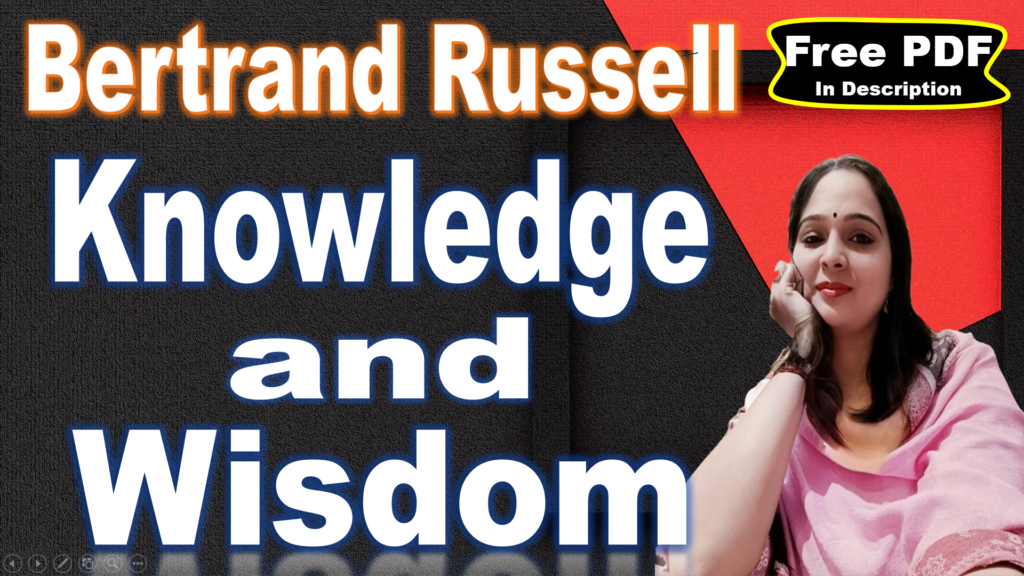
Essay Type Questions
Write the critical appreciation of the Essay “Knowledge and Wisdom” by Bertrand Russell.
Introduction Bertrand Russell, a renowned British philosopher, logician, and Nobel laureate, explores the relationship between knowledge and wisdom in his essay “Knowledge and Wisdom”. He emphasizes the importance of wisdom and suggests that in the absence of it, knowledge can be dangerous.
Definition of Wisdom Russell defines wisdom as the ability to use knowledge, understanding, experience, common sense, and insight to make sound decisions. He describes the factors that influence wisdom, including a sense of proportion, comprehensiveness with broad feeling, emancipation from personal prejudices and the tyranny of sensory perception, impartiality, and awareness of human needs and understanding.
Wisdom vs Knowledge Russell distinguishes between knowledge and wisdom. He states that knowledge involves acquiring data, while wisdom involves practical application and value creation through learning and experience. He critiques the global explosion of knowledge but emphasizes that knowledge and wisdom are not synonymous.
The Role of Wisdom Russell argues that wisdom is needed not only in public ways but in private life equally. In deciding what goals to follow and overcoming personal prejudice, wisdom is needed. He also suggests that wisdom is gained when a person’s thoughts and feelings become less persona.
The Danger of Knowledge Without Wisdom Russell gives the example of scientists and historians to illustrate how knowledge without wisdom can be dangerous. Scientists develop novel drugs but may not fully understand how these medicines will affect people’s lives. Similarly, historians like Hegel wrote with historical knowledge and made the Germans believe they were a master race, and this false sense of pride drove them to war.
The Aim of Education Russell believes that the true aim of education is to instill wisdom in individuals. He is assured that wisdom must be an integral part of education because a person can be well educated but lack the wisdom to understand the true meaning of life. Wisdom is required in education because knowledge alone leads to its misuse.
Conclusion In conclusion, Russell’s essay “Knowledge and Wisdom” is a profound exploration of the relationship between knowledge and wisdom. It emphasizes the importance of wisdom in using knowledge responsibly and highlights the dangers of knowledge without wisdom. The essay is a call to action for individuals and society to strive for wisdom, not just knowledge.
Detailed Analysis
Russell begins his essay by differentiating between knowledge and wisdom. He defines knowledge as the acquisition of data and information, whereas wisdom is the practical application and use of the knowledge to create value. He emphasizes that wisdom is gained through learning and practical experience, not just memorization.
He then discusses the factors that contribute to wisdom. According to him, a sense of proportion, comprehensiveness with broad feeling, emancipation from personal prejudices and the tyranny of sensory perception, impartiality, and awareness of human needs and understanding are all factors that contribute to wisdom.
Russell also discusses the dangers of knowledge without wisdom. He uses the example of scientists and historians to illustrate this point. Scientists develop novel drugs but have no idea how these medicines will affect people’s lives. Drugs may help lower the infant mortality rate. However, it may result in a rise in population, and the world is sure to face the consequences of the rise in population. Once, Hegel, the greatest historian, wrote with historical knowledge and made the Germans believe they were a master race, and this false sense of pride drove them to war.
Russell emphasizes the importance of wisdom in both public and private life. He suggests that wisdom is needed to decide the goal of our life and to free ourselves from personal prejudices. He also suggests that wisdom emerges when we begin to value things that do not directly affect us.
In the end, Russell discusses the role of education in instilling wisdom. He believes that the true aim of education is to instill wisdom in individuals. He is assured that wisdom must be an integral part of education because a person can be well educated but lack the wisdom to understand the true meaning of life. Wisdom is required in education because knowledge alone leads to its misuse.
In conclusion, Russell’s essay “Knowledge and Wisdom” is a profound exploration of the relationship between knowledge and wisdom. It emphasizes the importance of wisdom in using knowledge responsibly and highlights the dangers of knowledge without wisdom. The essay is a call to action for individuals and society to strive for wisdom, not just knowledge.
Write long note on Bertrand Russell as Essayist.
Bertrand Russell, a British philosopher, logician, and social reformer, was also a prolific essayist whose works have had a profound influence on the 20th century intellectual landscape.
Style and Approach Russell’s essays are characterized by a clear, logical style and a precise approach. He always argues his case in a strictly logical manner and his aim is exactitude or precision. As far as possible, he never leaves the reader in any doubt about what he has to say. He stresses the need for rationality, which he calls skepticism in all spheres of life. Each of his essays is logically well-knit and self-contained.
Themes and Topics Russell’s essays cover a wide range of topics, reflecting his broad interests and deep knowledge. He wrote on philosophy, mathematics, logic, social reform, and peace advocacy. His essays often addressed contemporary social, political, and moral subjects, making them relevant and accessible to a general audience.
Influence and Impact Russell’s essays have had a significant impact on various fields. His contributions to logic, epistemology, and the philosophy of mathematics established him as one of the foremost philosophers of the 20th century. However, to the general public, he was best known as a campaigner for peace and as a popular writer on social, political, and moral subjects.
Recognition Russell’s work as an essayist and writer was recognized with the Nobel Prize for Literature in 1950. This award attests to the quality of his writing and the influence of his ideas.
In conclusion, Bertrand Russell’s work as an essayist is characterized by its clarity, precision, and logical rigor. His essays, which cover a wide range of topics, have had a significant impact on various fields and continue to be widely read and studied.





